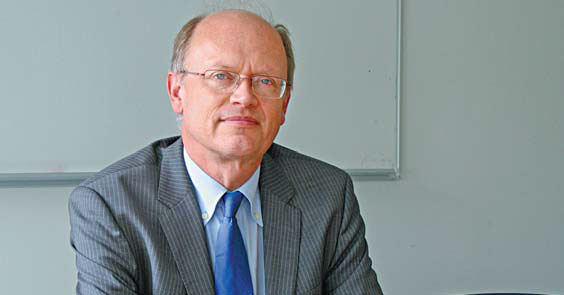China's key role in climate change talks
China has become a leading actor on global climate issues, and its scientists specializing in the subject have grown in stature over the past few decades, says Jean-Pascal van Ypersele, vice-chairman of the United Nations Inter-governmental Panel on Climate Change.
"China is a major actor and an economic power with large resources in coal, so we cannot reach an international agreement likely to protect the climate without its substantial participation in the discussions," Van Ypersele says.
"Therefore China has a responsibility in this area, and also as a partner of developed countries in order to develop new technologies and implement ambitious policies."
|
Jean-Pascal van Ypersele is vice-chairman of the United Nations Inter-governmental Panel on Climate Change. Provided to China Daily |
Van Ypersele, who is now a candidate for the IPCC presidency, says China started its efforts a few years ago when it developed a partnership with the EU on carbon markets, and this has resulted in an exchange of technologies and practices, and in China being able to learn how the European system of emissions trading works.
"I am convinced that in the development of technologies in the near future, other regions of the world will learn from China in the fields of solar cells, electronic development and batteries to stock energy," Van Ypersele says.
New ways to store energy need to be found, he says.
"I believe that Chinese technologies will bring a part of the solution, just like the European and American technologies. I am sure that China's contribution in the coming decades will be very significant."
Van Ypersele says he is optimistic about the UN conference on climate change in Lima, Peru, in December. The climate change conference in Paris late next year is even more significant, he says, given that the aim is to reach a new international agreement on the issue.
"It is very difficult to foresee. It will largely depend on whether people have a deep enough perception and a deep enough understanding that we really are sharing this one "house".
"I can also say that it is the only boat on the ocean, and if we start to argue on this boat, then it will turn bad. The boat can only go in one direction, not several. If we argue too much we run the risk of a storm striking and the boat sinking. We have no choice."
Van Ypersele says that many problems are on the international agenda and need a lot of attention from many countries.
"We will need to know first in Lima and especially Paris if there is enough political will to overcome short-term issues."
Views on climate change differ from country to country, which is why discussions on the issue can be so fraught, he says.
Van Ypersele says it is understandable that in countries where people have no access to water, drinking water, electricity, energy and social welfare the top priority is to lift people out of poverty.
However, such problems are global, so the solutions must be global, too. Every country needs to play a role, and if they do not they run the risk of falling behind, he says.
"It is a bit like 40 years ago when you could smoke inside buildings. Nowadays in many countries it is inconceivable to smoke inside a building or a room, in a cinema or on a train. I think many things feel normal today, but it will not be the case in 20 to 30 years' time. Therefore there is no time to lose. If we can go toward this change faster, then it will be very useful."
Van Ypersele says the future lies in the hands of human beings rather than in the hands of fate.
"There is no difference between Belgian, Chinese or Africans when we talk about the future; everybody shares some responsibility. For some this responsibility may be greater than for others."
Van Ypersele says he has been involved with the IPCC for almost 20 years, took part in its first meeting in 1995, and has held different roles in the organization.
First, he was a scientific representative for Belgium, author of the third IPCC report, was a member of the IPCC's group 2 until 2008 and was elected one of three vice-presidents in 2008.
"It is a veritable pleasure for me to contribute with my knowledge as a climatologist specializing in climate physics but also someone interested in development, and particularly sustainable development."
For China Daily



















